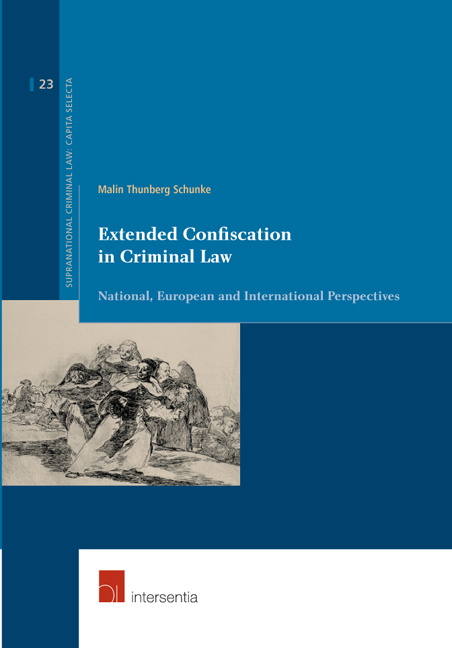Book contents
- Frontmatter
- Preface
- Contents
- Table of Cases
- List of Abbreviations
- Part I Introduction
- Part II Substantive Provisions on Extended Confiscation
- Part III The Legal Framework for International Cooperation
- Chapter 8 International Cooperation in the Area of Confiscation
- Chapter 9 Cross-Border Asset Tracing and Exchange of Information
- Chapter 10 International Cooperation in Order to Seize or Freeze Assets
- Chapter 11 International Cooperation in Order to Execute Final Confiscation Orders
- Chapter 12 The Proposal for a Regulation on Mutual Recognition
- Chapter 13 Final Remarks: “To Go for the Money” – But How?
- Bibliography
- Index
- About the Author
Chapter 10 - International Cooperation in Order to Seize or Freeze Assets
from Part III - The Legal Framework for International Cooperation
Published online by Cambridge University Press: 11 October 2018
- Frontmatter
- Preface
- Contents
- Table of Cases
- List of Abbreviations
- Part I Introduction
- Part II Substantive Provisions on Extended Confiscation
- Part III The Legal Framework for International Cooperation
- Chapter 8 International Cooperation in the Area of Confiscation
- Chapter 9 Cross-Border Asset Tracing and Exchange of Information
- Chapter 10 International Cooperation in Order to Seize or Freeze Assets
- Chapter 11 International Cooperation in Order to Execute Final Confiscation Orders
- Chapter 12 The Proposal for a Regulation on Mutual Recognition
- Chapter 13 Final Remarks: “To Go for the Money” – But How?
- Bibliography
- Index
- About the Author
Summary
THE LEGAL FRAMEWORK
REQUESTS FOR MLA
When assets have been identified and located, provisional coercive measures may be necessary in order to avoid that a suspect disposes of the assets before the court has made a final decision on confiscation. An efficient regime of cross-border seizure or freezing of any assets identified as criminal proceeds is crucial. The seizure/freezing of property may be necessary in order both to secure evidence needed to support a motion for confiscation and/or to secure property in order to be able to execute a final confiscation order.
International provisions allowing for requests regarding coercive measures are found in a number of instruments on cooperation in criminal matters, for example Articles 1 and 5 of the European Convention on Mutual Assistance in Criminal Matters (1959) (hereafter the “1959 Convention”), Article 13(2) United Nations Convention against Transnational Organized Crime (2000), Article 11 European Convention on Laundering, Search, Seizure and Confiscation of the Proceeds from Crime (1990) and Article 21 Council of Europe Convention on Laundering, Search, Seizure and Confiscation of the Proceeds from Crime and on the Financing of Terrorism (2005). There is often a rather broad range of refusal grounds regarding such requests, and a common requirement in international conventions on MLA is that a demand for double criminality is set up for coercive measures like seizure. According to Article 5 of the 1959 Convention, the States are allowed to set up the following requirements for the execution of a request for search or seizure of property:
– a requirement of double criminality,
– a requirement that the criminal offence is an extraditable offence in the requested State, and/or
– that the execution of the request is compatible with the law of the requested State.
Within the EU, the Schengen Convention has modified the right to reservations regarding Article 5 of the 1959 Convention, and has limited the scope for refusing requests for international requests for MLA in this respect.
- Type
- Chapter
- Information
- Extended Confiscation in Criminal LawNational, European and International Perspectives, pp. 263 - 280Publisher: IntersentiaPrint publication year: 2017



